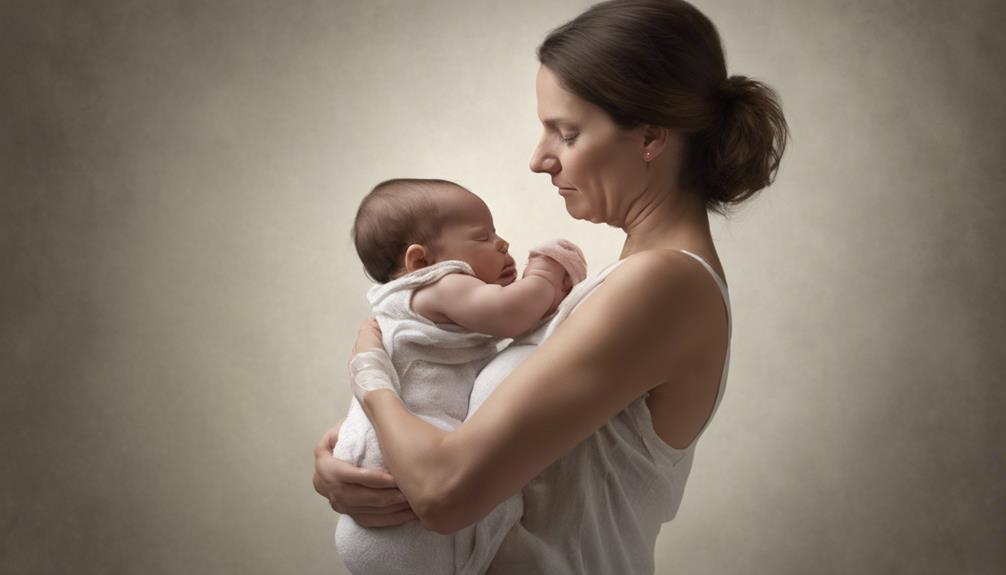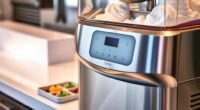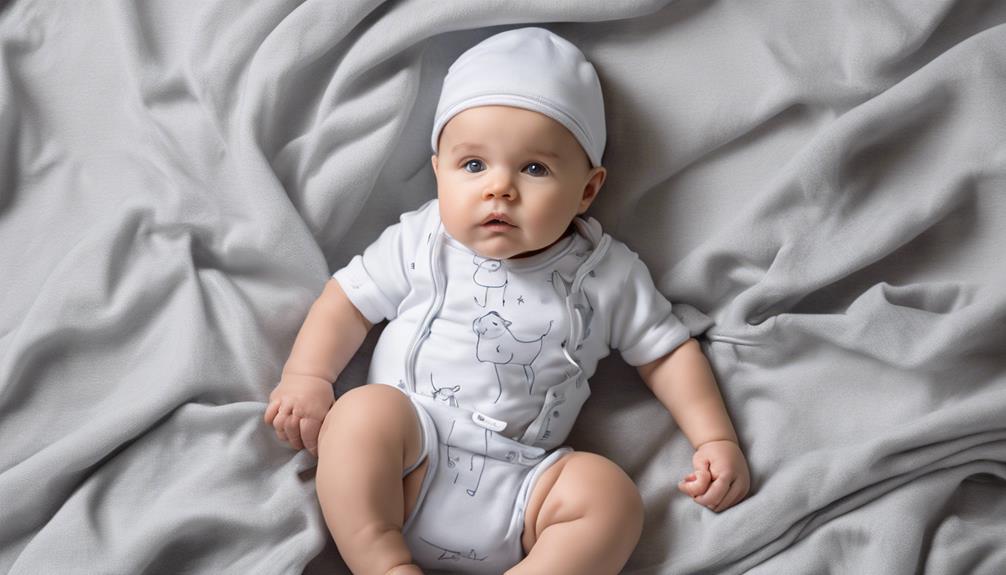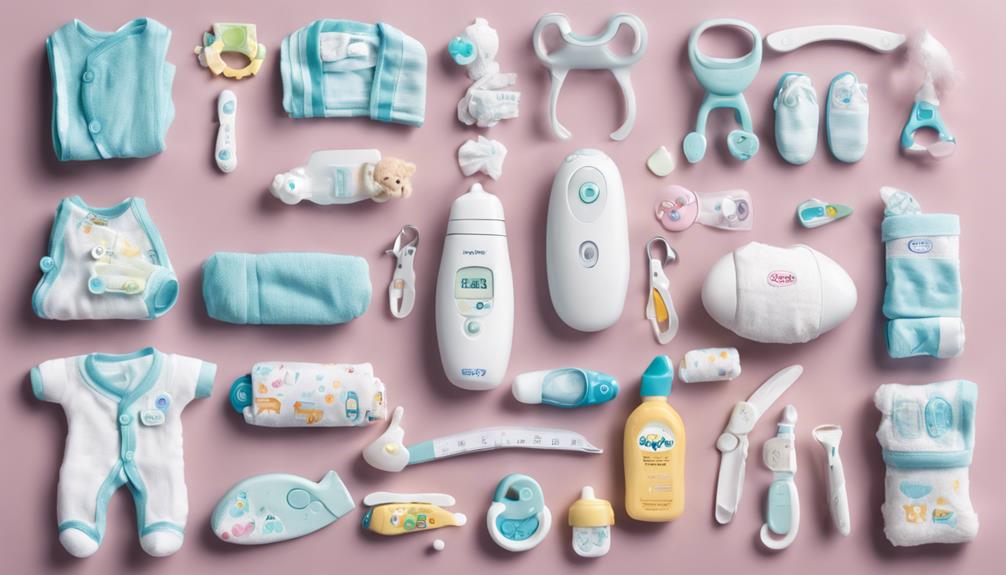When your newborn's little body is like a symphony of tiny hiccups, it can be concerning and leave you wondering what to do next.
With a myriad of methods available, from gentle burping techniques to using a pacifier strategically, finding the right approach can make all the difference in soothing your baby's discomfort.
Stay tuned to discover the most effective ways to ease those adorable but pesky hiccups for your little one.
Key Takeaways
- Proper burping techniques aid in relieving newborn hiccups.
- Pacifiers offer soothing relief for hiccups in infants.
- Correct positioning after feeding helps prevent and alleviate hiccups.
- Monitoring feeding patterns can help adjust to reduce newborn hiccups.
Understanding Newborn Hiccups
Do you ever wonder why newborns experience hiccups so frequently and what causes them? It's quite common for newborns to have hiccups, as their tiny bodies are still learning to coordinate various functions. These hiccups are often triggered by factors like diaphragm irritation, which can occur when babies eat too quickly or swallow air while feeding.
Surprisingly, these hiccups play a crucial role in the development of your baby's diaphragm and respiratory muscles.
The good news is that most newborn hiccups tend to resolve on their own within 5 to 10 minutes. Understanding the causes behind these hiccups can help you effectively manage and even prevent them. By ensuring your baby feeds calmly and is burped regularly during and after meals, you can help reduce the occurrence of hiccups.
Burping Techniques for Relief

If your newborn is experiencing hiccups, mastering effective burping techniques can provide much-needed relief and prevent further discomfort during and after feedings. Important burping plays a vital role in releasing trapped air from your baby's stomach, reducing the chances of hiccups.
For bottle-fed infants, remember to burp them every 2-3 ounces to avoid excessive air intake that could trigger hiccups. Breastfed babies benefit from burping when switching between breasts to ease gas buildup and minimize hiccups.
These burping practices not only aid in digestion but also contribute to a more comfortable feeding experience for your little one. By incorporating proper burping techniques into your routine, you can help maintain a healthy digestive system in your newborn and decrease the frequency of hiccups. Remember, consistent burping is key to ensuring your baby's comfort and well-being.
Pacifier Soothing Method

Using a pacifier can be a comforting and effective method to help alleviate your newborn's hiccups. When your little one is experiencing those pesky hiccups, offering a pacifier can provide soothing relief in a gentle and non-invasive way. Here are some key points to take into account:
- Soothe the Diaphragm: The sucking motion on a pacifier may help relax your newborn's diaphragm muscles, potentially aiding in the cessation of hiccups.
- Comfort and Relief: Pacifiers are safe for newborns and can offer comfort while addressing hiccups, making it a reassuring method for both you and your baby.
- Non-Invasive Solution: Opting for a pacifier is a gentle approach to alleviate hiccups without causing any discomfort or distress to your little one.
- Simple and Effective: Offering a pacifier as a soothing method is a straightforward and efficient way to manage your newborn's hiccups, providing quick relief.
- Convenient Comfort: Having a pacifier on hand can offer immediate comfort to your baby during hiccup episodes, making it a practical solution for soothing your little one.
Positioning for Hiccup Relief

Position your newborn in an essential position after feeding to help alleviate hiccups by relieving pressure on the diaphragm. By holding your baby upright, you can prevent stomach contents from flowing back up, aiding in digestion and reducing the chances of hiccups. Ensuring your little one is content and calm during and after feeding can also minimize the likelihood of hiccups occurring. Properly supporting your baby's head and neck while in an essential position is vital to prevent any discomfort and assist in relieving hiccups. Remember to avoid sudden movements that could startle your baby, maintaining a peaceful environment that can help alleviate hiccups effectively. To guide you better, here is a table illustrating the positioning techniques for hiccup relief:
| Positioning for Hiccup Relief | Description | Benefits |
|---|---|---|
| Upright | Hold your baby upright | Relieves diaphragm pressure |
| Slightly Inclined | Place baby in a slight incline | Aids in digestion |
| Calm and Relaxed | Keep baby content and relaxed | Minimizes hiccups |
Preventing Hiccups in Newborns

To prevent hiccups in newborns, make sure proper burping techniques are utilized during and after feedings to release trapped air in the stomach. Here are some tips to help you prevent hiccups in your little one:
- Offer a pacifier to help relax the diaphragm and decrease the chances of hiccups.
- Make sure you're using proper feeding techniques, such as holding your baby upright while feeding, to reduce the occurrence of hiccups.
- Avoid overfeeding your baby as this can lead to digestive issues that may trigger hiccups.
- Track the timing of hiccups in your newborn to identify any patterns and adjust feeding schedules accordingly to prevent hiccups.
Frequently Asked Questions
How Do I Relieve My Newborns Hiccups?
When your newborn hiccups, try burping, offering a pacifier, proper feeding techniques, keeping them upright after meals, and avoiding overfeeding. These simple steps can help ease your little one's discomfort and prevent frequent hiccups.
Is It OK to Lay Baby Down With Hiccups?
It's safe to lay your baby down with hiccups; it won't harm them. Newborn hiccups are common and usually resolve on their own. So, feel at ease continuing with your baby's routine, including nap and bedtime.
What Is the Best Position for Baby Hiccups?
When your baby has hiccups, holding them upright against your chest can help release trapped air. Placing them in a slightly upright position in a carrier or seat after feeding can also ease hiccups.
What Stops Hiccups Quickly?
When hiccups strike, try burping, offering a pacifier, changing positions, or gently rubbing the back. Stick to baby-friendly remedies for quick relief. Remember, avoiding adult solutions is key to stopping hiccups swiftly and safely in newborns.
Conclusion
So, next time your newborn has hiccups, remember to try these effective techniques for relief.
Remember, hiccups are a natural occurrence and usually harmless. Just stay calm, try different methods, and know that these hiccups won't last forever. Your little one will be hiccup-free in no time.
Just when you think you've got it all figured out, those hiccups may surprise you again – but hey, that's parenting for you!









